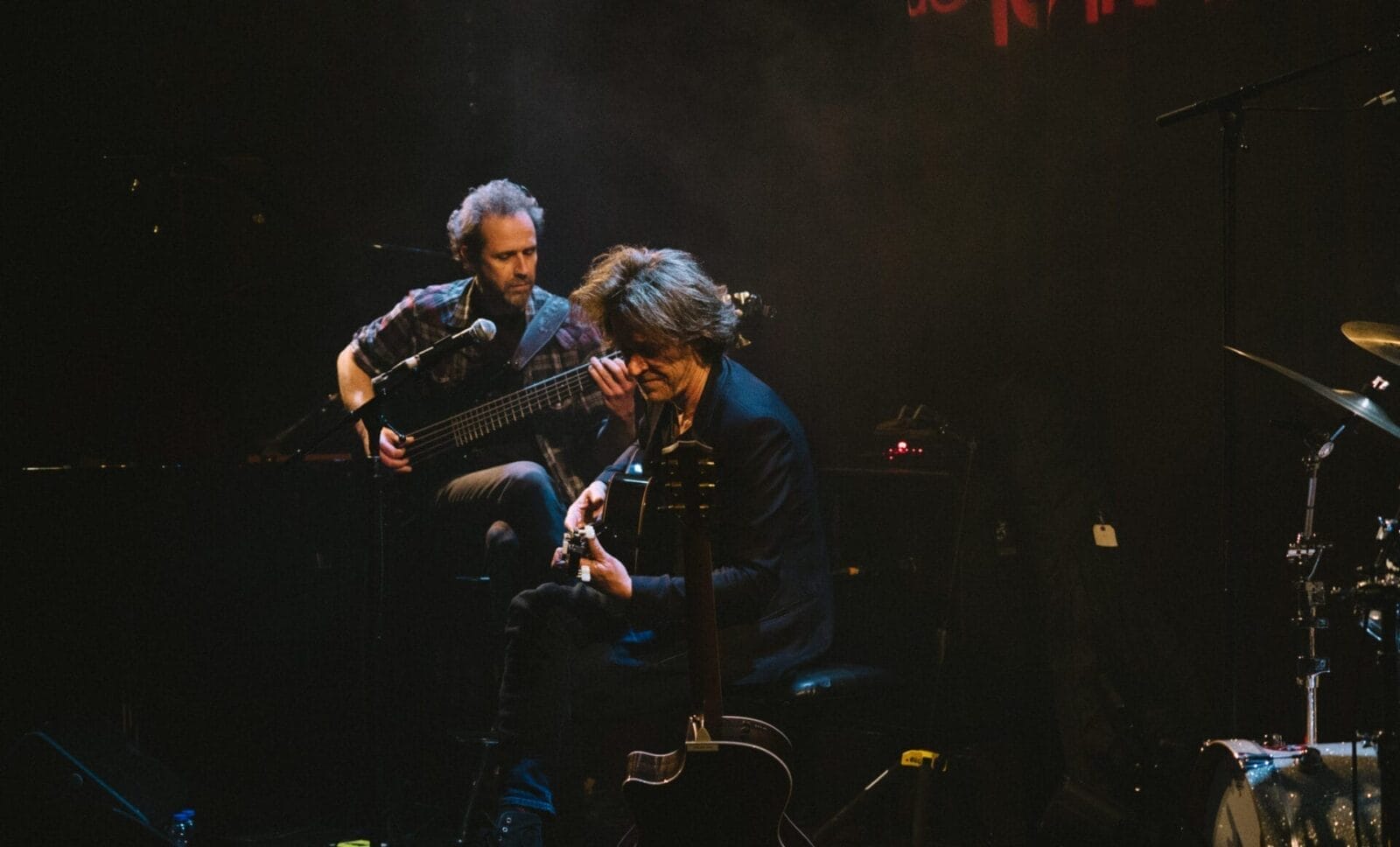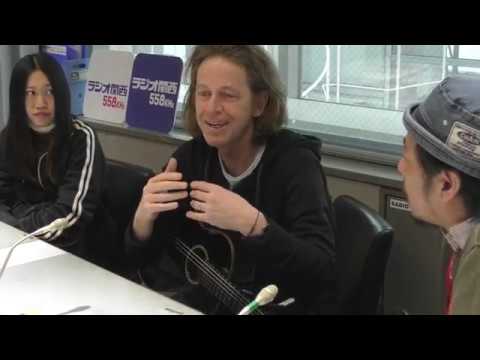ドミニク・ミラーの音
ドミニクがミュージシャンとしての初来日したのは1989年ジュリア・フォーダムのツアー・メンバーとしてです。もちろんそれ以降彼はスティングのコンサートで数え切れないほど来日していますが、彼自身のコンサートで日本に定期的に来るようになったのは2014年からです。
2019年にドミニクが『Absinthe』のツアーで来日した時に大阪のFMのラジオ番組に出演した時の動画がありますので、これについて少しお話しします。これはYouTubeにありますのでひょっとしたら見た事がある人もいるかもしれませんね。
この映像を見て改めて驚いたのは、放送スタジオでの音楽にはあまり向いていないマイクで拾われているにもかかわらず、映像の中盤でドミニクが弾いているギターの音の美しさです。非常に張りと艶があり、クリアで芯のある印象の音です。
ドミニクは機材や環境に依存せずに、自分自身でいい音を出したいと思って音をよくする事を追求しているギタリストです。スタジオでも、コンサート会場でも、或いは海辺でも同じ良い音を出したいと思って努力している人なんで、当然と言えば当然なんですが、改めて本当にいい音だなあ、と感じました。
そしてこの彼の音の素晴らしさは、やはり会場で実際に聴かない限り、本当の意味では知る事は出来ないと私は思います。ですから特にギタリストで音を良くしたいと思っている方は是非4月のコンサートで実際に聴いてほしいと思います。
ドミニクの日本の観客への印象
また、ドミニクがこの動画の中でいくつか、ミュージシャンとして日本のオーディエンスに対して感じている事を語っています。そこでは彼の音楽のとても重要な「核」の一つについても言及しています。通訳の方が割とざっくりとドミニクの言葉を伝えているので、最も大事な部分だけ編集して出来るだけドミニクの言葉に忠実な形でキャプションをつけて見ました。
これは日本のラジオで語っている事なので、本当はこのようにドミニクが感じている国も他にあるかもしれません。しかし、少なくとも日本のオーディエンスは自分の音楽を深く理解して真剣に聴いてくれる、という事を彼が感じているのは間違いないと思います。
ドミニクの音楽の最も大事なキーの一つが、この動画で最後に彼が言っている言葉です。
【I think that space is as important as sound.】空間は音と同じくらい重要だと思います。
この彼の音楽の核心部分が最も純粋な形でコンセプトとして表現されているのが、アルバム『Silent Light』(2017)です。このアルバムについてはこちらをお読みいただければと思います。
日本の芸術の空間概念
また、ドミニクは「日本は演奏しやすい国かどうか」という質問にこのように答えています。
「この国でプレーするのは心地よいと感じます。何故なら世界で唯一、とてもソフトな演奏ができ、多くの空間を残して演奏することができる国だと感じるからです。私はこの国では多くの空間を(音楽の中に)残すことが怖くありません。この「空間」は、日本ではうまく機能しているように感じるコンセプトの一つです。」
私はドミニクにドイツに会いに行った時にこの上の部分について手紙を書きました。
「日本人が何故あなたの音楽を真剣に聞こうとするのか、その理由を説明しましょう」と。
その理由は『Silent Light』の記事中でも少し触れていますが、日本という国の昔からの文化、宗教、芸術における美学、そして言語など、非常に深い部分に関連しています。特に芸術分野においては、アルバム『Silent Light』のコンセプトは日本の美学、いわゆる『余白の美』とか『欠落の美』と呼ばれるものとの類似性があります。
日本の芸術は空間を強く意識している事が多いです。空間を多く残し、描く対象物とそれが置かれる空間とのバランスをとても考えます。西洋美術における「空間」とは基本的には「何もない」ことを意味しますが、日本美術においては「空間」が大きな表現的意味を持ち、あえてそれを残します。「空間がある=何も無い」という事では無い事を日本人は良く知っています。
この事を日本の美術などを例にドミニクに詳しく説明した所、彼は日本の美学や芸術観はとても素晴らしい、と深い共感を示してくれました。
この事はもっと深く言えば日本語の特性や日本という国がほぼ単一民族国家と定義され、ずっと古くからの文化や歴史が続いている事とも関係しています。日本語はあまり論理的な言語ではなく、英語とは真逆の言語です。とても曖昧で感覚的な言語なので、日本人同士は常に五感をフル活動して相手とコミュニケーションを図っています。相手が発した言葉だけではなく、ちょっとした表情、目の動きなどからも相手の本意を読み取ってコミュニケーションをしています。
なので、ドミニクがアルバム『Silent Light』の中でアルバムのコンセプトを最もストレートに表現した1曲目の「What You Didn’t Say」のシチュエーションは、日本語のコミュニケーションとしては特別なことでは無い「通常」の事です。
上記のような理由から、日本人は世界的な基準から照らし合わせるとかなり感覚的な部分が繊細に発達している民族だと思います。そしてドミニクが愛する「沈黙」に耐える事が出来る民族だと私は思います。だから、この上の動画のようにドミニクは感じたのだと思います。
空間を多く残した音楽表現について
そして、「私はこの国では多くの空間を(音楽の中に)残すことが怖くありません。」とドミニクは言っています。この言葉も本当によく理解できます。
ドミニクの音楽は構造はシンプルで、比較的音の数は少なく、ゆっくりとしたテンポで曲の中にできるだけ空間を残した曲が多いです。そういう曲を観客の前で演奏する事は、演奏者にとっては本当の意味でミュージシャンとしての実力を強く問われる、とても勇気が必要な事だと私は思います。
実際のコンサートで、こういう曲を演奏するミュージシャンは、一音一音にものすごく集中しなければなりません。小さなミスも普通の曲よりどうしても目立ってしまうので、僅かなことにも気を配り、一音一音をコントロールする必要があります。どの音も全く無駄にはできません。
また、ドミニクのように、「音」そのものが良くないと説得力がなくなり、リスナーの感情へ訴えかけるものが少なくなります。彼のような曲の演奏には誤魔化しは効きません。
「空間を多く残した音楽」というのは、ドミニク・ミラーというミュージシャンの大きな核心のテーマの一つです。そしてそれを追求する事は、大きな困難を伴います。しかしドミニクはそれにチャレンジしているミュージシャンであり、だからこそ私は彼を応援しています。
私はロック・スターではありません。
ちょっとした余談ですが、私は関東の人間なので、この番組の事はよく知りませんが、司会者の彼のコテコテの関西弁と、ドミニクの穏やかで優しい話し方がなんとも面白い微笑ましい対比です。
この動画見て皆さんもわかると思いますが、ドミニク・ミラーという人は紳士的な優しい雰囲気の人です。最近のドミニクのいわゆるアー写は結構ハードな雰囲気で強面っぽく写っていますけどね。このサイトの中でも度々書いていますが、日本ではドミニクはその音楽の雰囲気から「神経質で気難しそう」と思われている事がよくあるみたいです。実際、彼はあのような音楽性を持つ人ですから、とても繊細でロマンチストだと思いますが、この動画を見たら『神経質』という印象は感じないのではないでしょうか。彼はとても丁寧な対応をする人です。
実際昔、彼は、「自分はロックスターじゃないからどうぞお気軽に(コンサート会場では声をかけてください)」と言ってたくらいですし、コンサートに来たお客さんに対して態度が悪いミュージシャンの事を「全く理解できない」と言っていたこともあります。だから今度の来日公演でも彼は笑顔で対応してくれると思いますし、皆さんと会話できるのをとても楽しみにしていると思います。ですから是非皆さん、4月のライブに来ていただけたらと思います。
Dominic Miller’s Sound.
Dominic first came to Japan as a musician in 1989 as a touring member of Julia Fordham. Of course, he has visited Japan countless times since then for Sting concerts, but it wasn’t until 2014 that he started coming to Japan regularly for his own concerts.
There is a video of Dominic’s appearance on a radio show on FM in Osaka when he came to Japan in 2019, so I’m going to talk a little bit about that. It is on YouTube, so maybe some of you have seen it.
There is a video of Dominic’s appearance on a radio show on FM in Osaka when he came to Japan in 2019 for his ‘Absinthe’ tour, so I’m going to talk a little bit about that. It is on YouTube, so maybe some of you have seen it.
What struck me again when watching this video was the beauty of the guitar sound that Dominic plays in the middle of the video, even though it is picked up by a microphone that is not really suited for music in a broadcast studio.It is very taut and grossy, and the sound is a clear and with a core impression.
Dominic is a guitarist who wants to improve his sound on his own, without relying on equipment or the environment. It’s no surprise his sounds good that because this is a man who strives to sound just as good at all times, whether in the concert hall, in the studio or on the beach, but once again I feel it was wonderful.
And I still believe that you have to hear him in person at the venue to understand how great his sound is. So I would encourage guitarists, especially those who want to improve their sound, to come to Dominic’s concert in April.
Dominic’s impression of Japanese audiences.
Dominic also talks in this video about some of the things he feels about the Japanese audience as a musician. And there he mentions one very important ‘core’ in his music.
The interpreter concisely convey the meaning of Dominic’s words only briefly, so I edited only the important parts of the video and subtitled it as closely as possible to what Dominic was saying.
This is what Dominic is talking about on Japanese radio, so there may be other countries where Dominic feels this way. But I think it’s true that he feels that at least Japanese audiences take his music seriously and understand it deeply.
One of the most important keys of Dominic’s music is what he said at the end of this video.
【I think that space is as important as sound.】
This core of his music is expressed in its purest form as a concept on the album “Silent Light” (2017). You can read more about this album here.
Japanese concepts of space in art.
And when asked if Japan was a country he felt comfortable performing in, Dominic said,
“I do feel comfortable playing here, because I feel this is one of the only countries in the world that I can play where I can play something very soft and leave a lot of space and it works. And I’m not afraid to leave a lot of space here and this space is a kind of concept that seems to work here.”
When I went to see him in Germany, I gave Dominic a letter I had written to him about the above.
“Let me explain why the Japanese take your music seriously, because I know why.”
The reason, which is touched on briefly in the article “Silent Light”, relates to very deep aspects of the ancient culture, religion, aesthetics in art and language of the country of Japan. Particularly in the field of art, the concept of the album “Silent Light” shows similarities with Japanese aesthetics, the so-called ‘beauty of margins’ and ‘beauty of lack’.
Japanese art often has a strong awareness of space. It leaves a lot of space and very much considers the balance between the object to be painted and the space in which it is placed. While ‘space’ in Western art basically means ‘nothing’, but in Japanese art, ‘space’ has a great expressive meaning, and we dare to leave it.The Japanese know very well that “space” does not “nothing.”
When I explained this in detail to Dominic, using Japanese art as an example, he expressed deep empathy with the Japanese concept of aesthetics and space.
Speaking more deeply, this is related to the fact that Japan is defined as a single ethnic nation with a long culture and history, and to the characteristics of the Japanese language. Japanese is not a very logical language and is the opposite of English.Japanese is a very ambiguous and sensual language, so Japanese people constantly communicate with each other using all five senses. They communicate not only through each other’s words, but also by reading each other’s true intentions from the smallest things, such as facial expressions and eye movements.
So the situation in the first song ‘What You Didn’t Say’, which is Dominic’s most direct expression of the album’s concept on “Silent Light”, is a very usually situation that’s nothing special in Japanese communication.
For the above reasons, I think it can be said that the Japanese are a people whose senses are quite delicately developed, even from a global perspective. And I believe that the Japanese are a people who can withstand the ‘silence’ that Dominic loves. I think that’s why Dominic felt like he was talking in the video.
Musical expressions that leave a lot of space.
And “I’m not afraid to leave a lot of space here I’m not afraid to leave a lot of space [in music] in this country.” Dominic says. I really understand these words too.
I think it takes a lot of courage for a musician to play songs like that in front of an audience, because it is a real test of their abilities as a musician.
It is not easy to keep the listener focused on the performance when playing such music in a real concert. It is really difficult. Musicians who play these songs have to concentrate extremely hard on every single note. Small mistakes are inevitably more noticeable than in a normal song, so you have to pay attention to the smallest details and control every single note. Any notes can’t be wasted.
Also, like Dominic, the “sound” itself has to be very good. Otherwise, your message will not be convincing and will not appeal to the listener’s emotions. It is basically impossible to cheat when performing the songs like his.
“Music with a lot of space” is one of Dominic Miller’s main themes. And it has many difficulties to pursue. But Dominic is a musician who takes on this challenge, and that’s one of a big reason why I support him.
I’m not a Rock Star.
Just a quick aside, I am not familiar with the broadcast as I live near Tokyo, Japan, but the contrast between the strong western Japanese accent of the presenter and Dominic’s calm, gentle way of speaking is a little amusing.
As this video shows, Dominic is a calm and gentle-looking man. Although many of his recent official photos have a very strong expression.
I have often written on this website that in Japan people sometimes think that Dominic is ‘nervous and stubborn’ because of the atmosphere of his music.In fact, given his musicality, I think he’s a very sensitive and romantic person but I don’t think you get the impression from this video that he’s ‘nervous and stubborn’. He is a very polite person.
In fact, he said that he wanted people to feel free to talk to him (in concert venues) because he wasn’t a rock star, and that he doesn’t understand musicians who have a bad attitude towards their audiences. So I am sure he is very much looking forward to his upcoming visit to Japan and he want to talking and interacting with the audience.
I hope you will come to his concerts in April.


